Charles E W Bean, Diaries, AWM38 3DRL 606/245/1 - 1915 - 1925 - Part 9
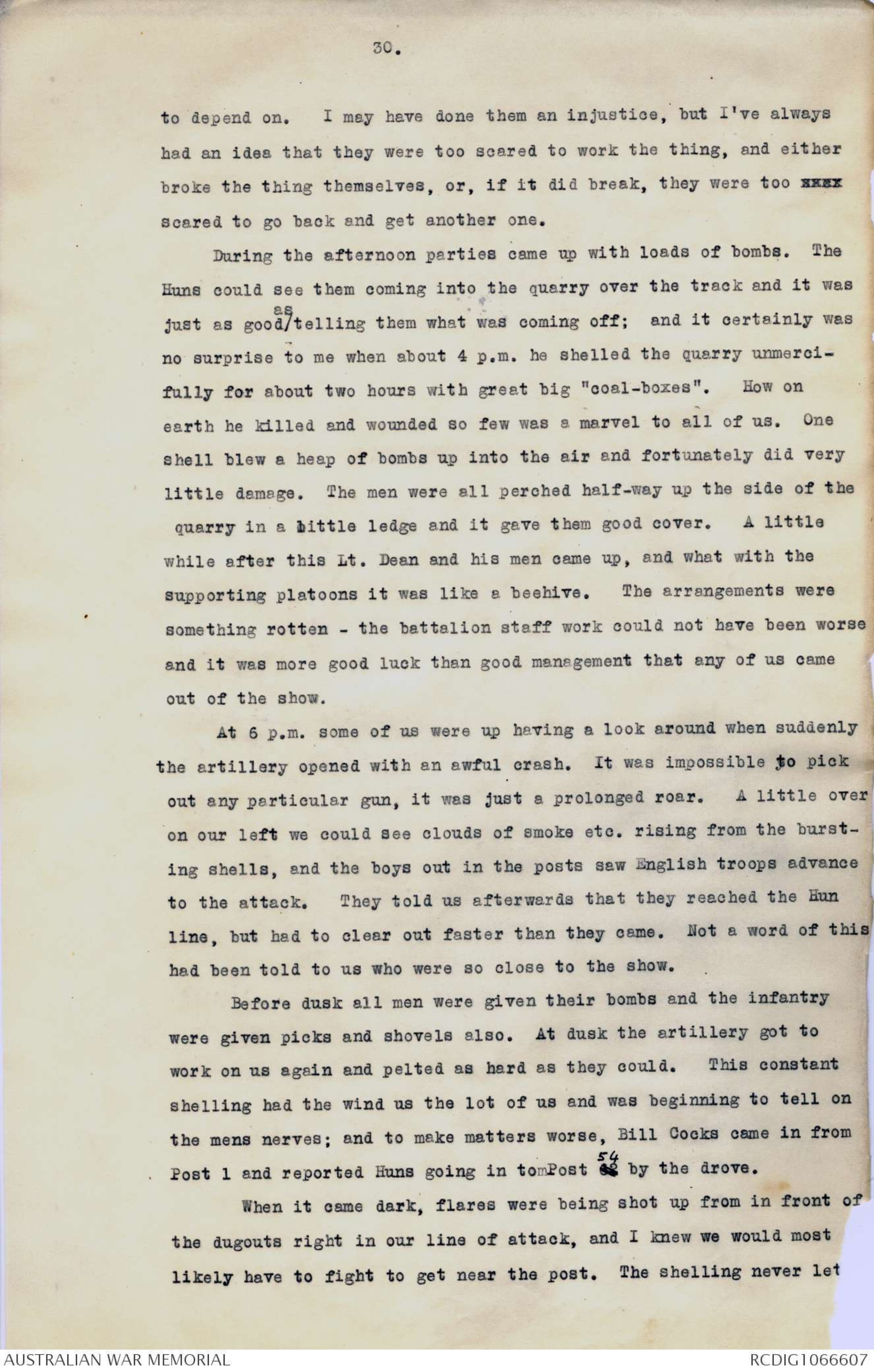
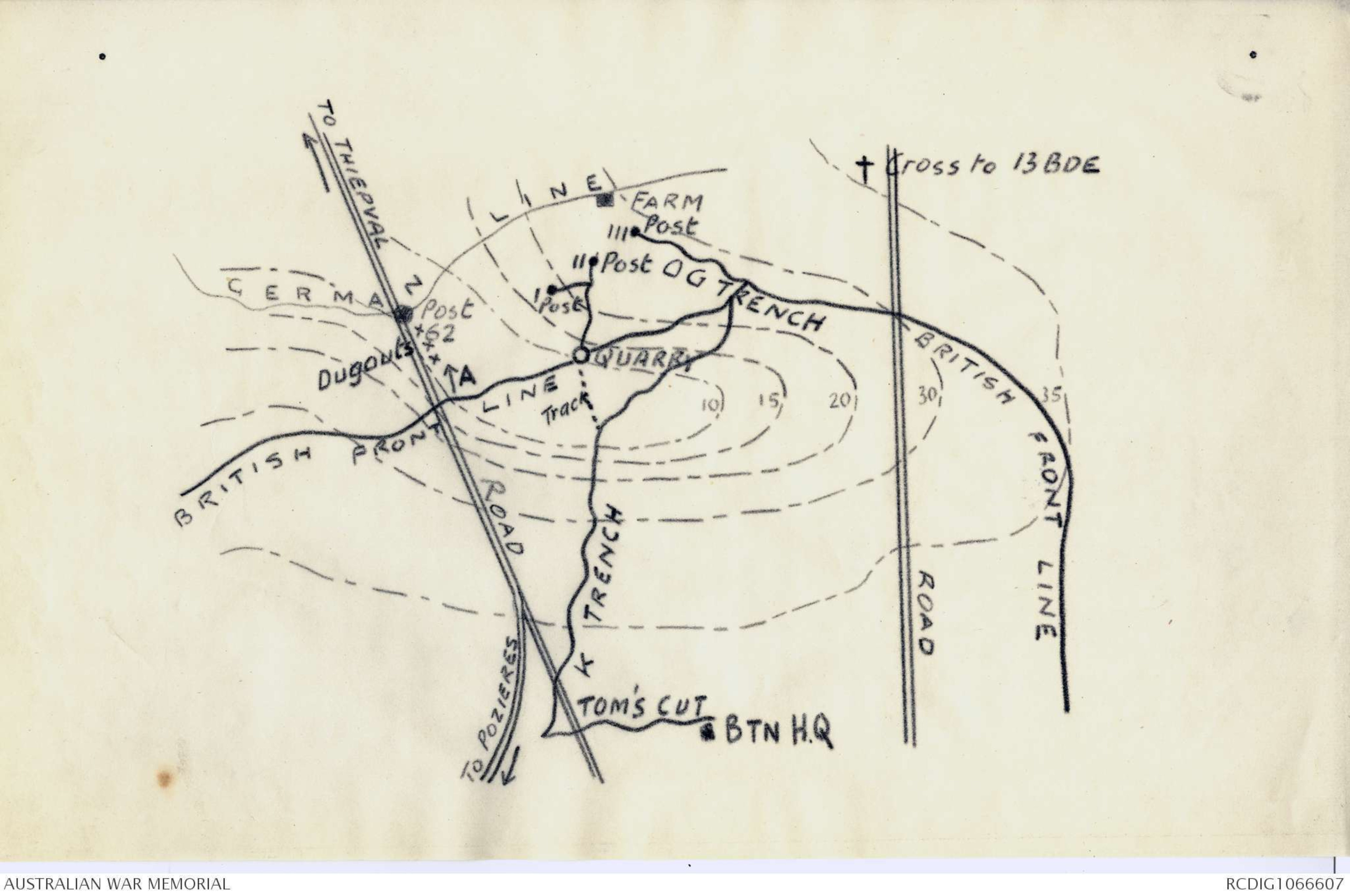
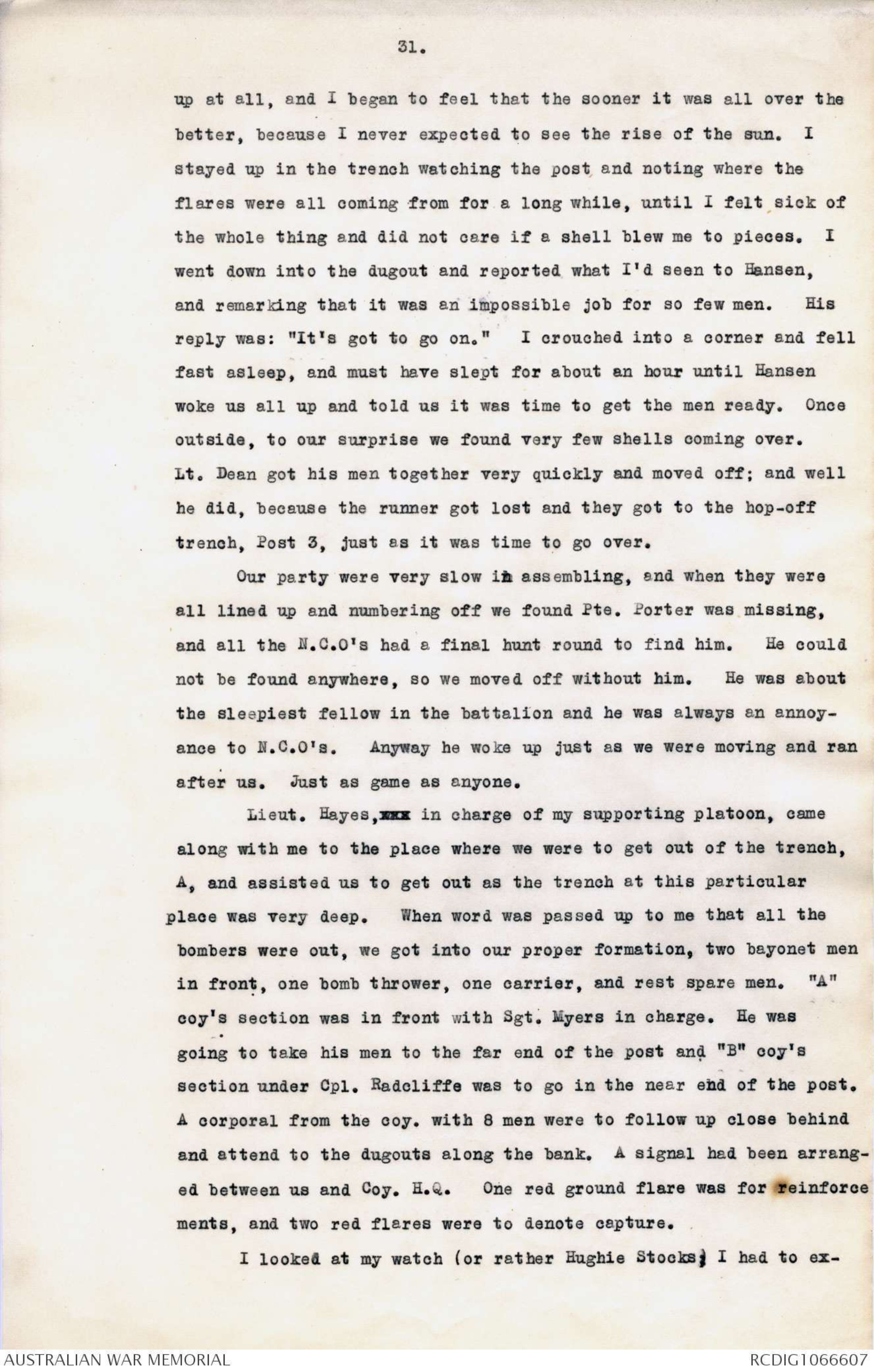
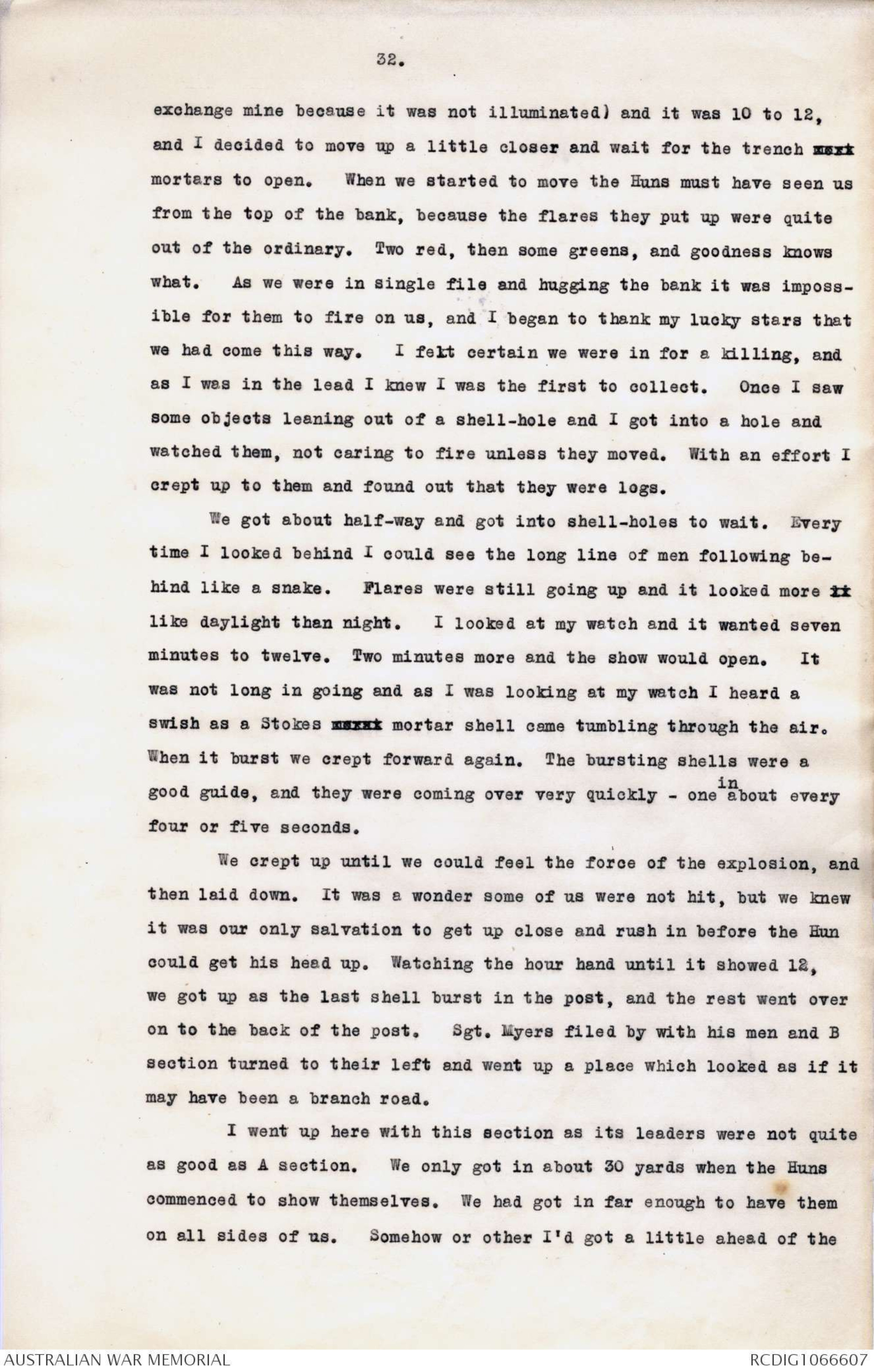
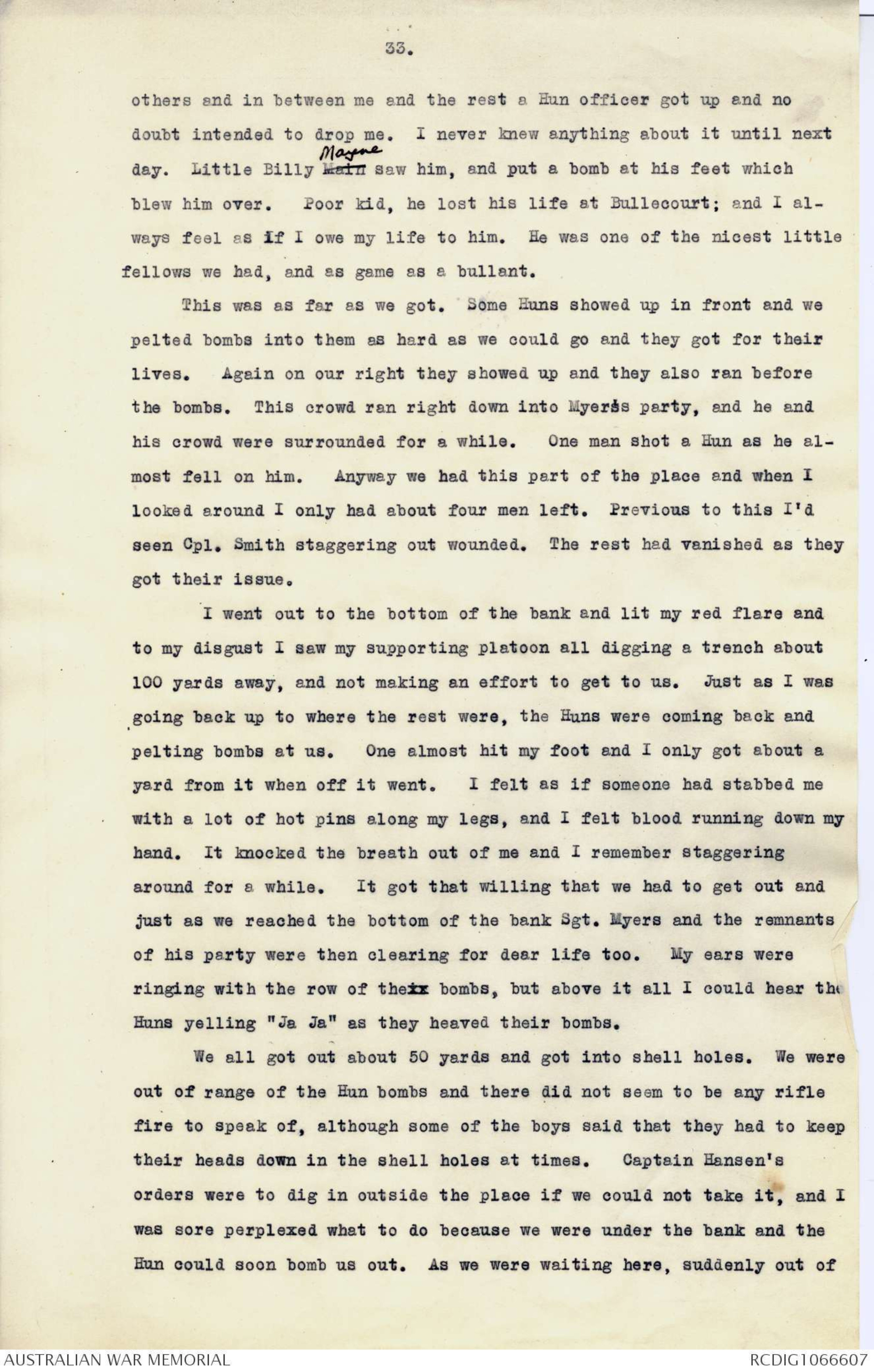
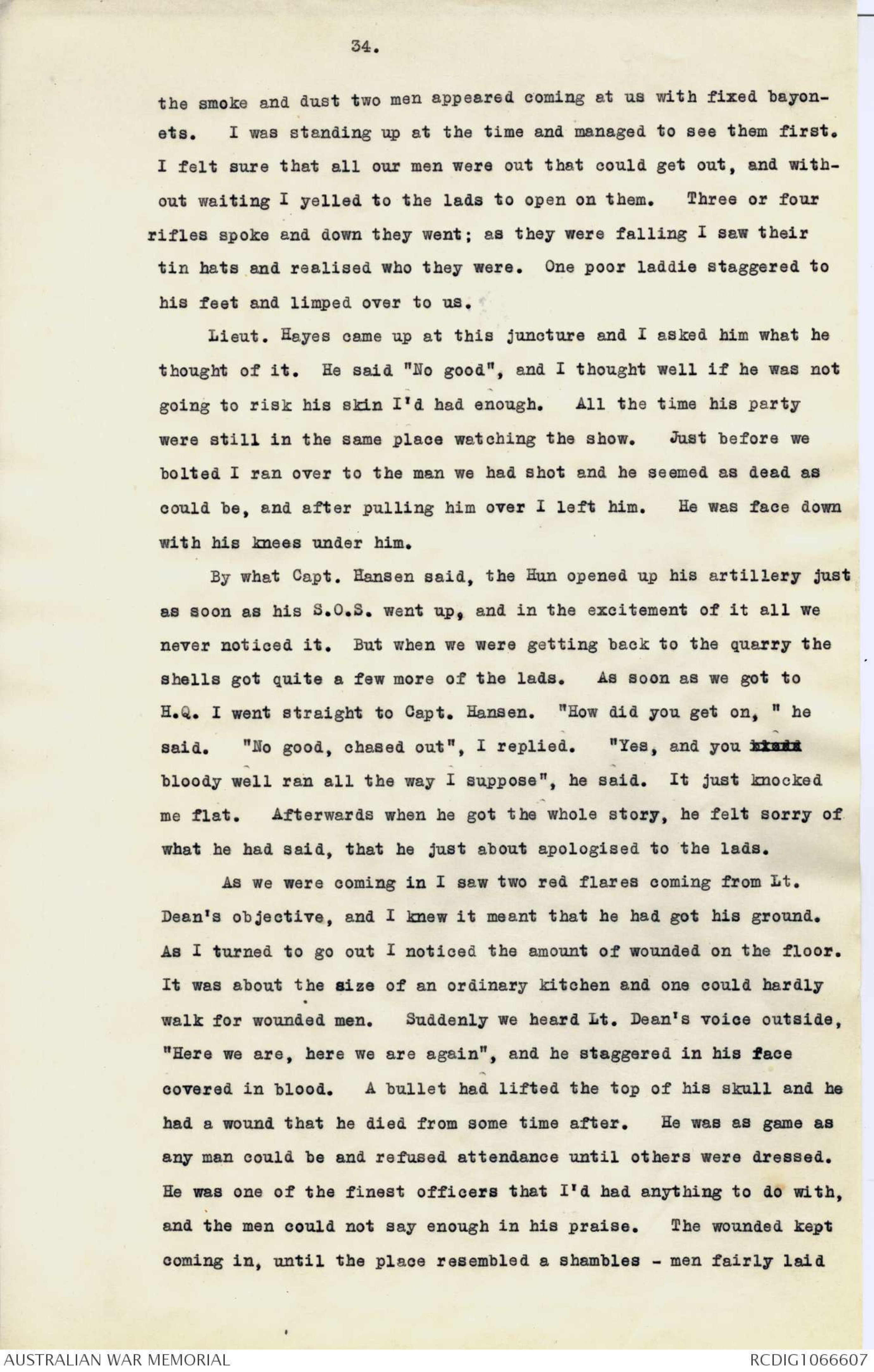
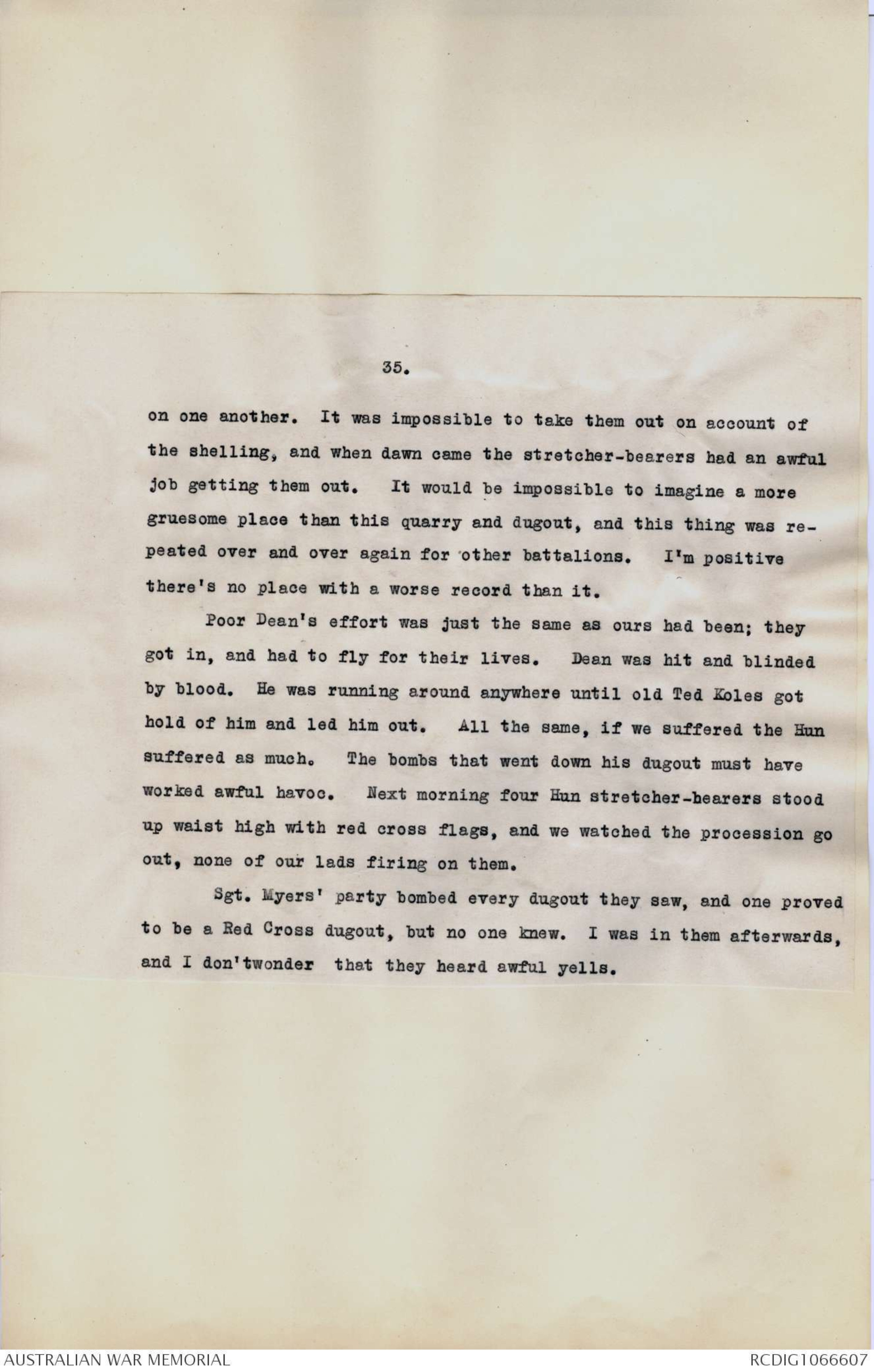
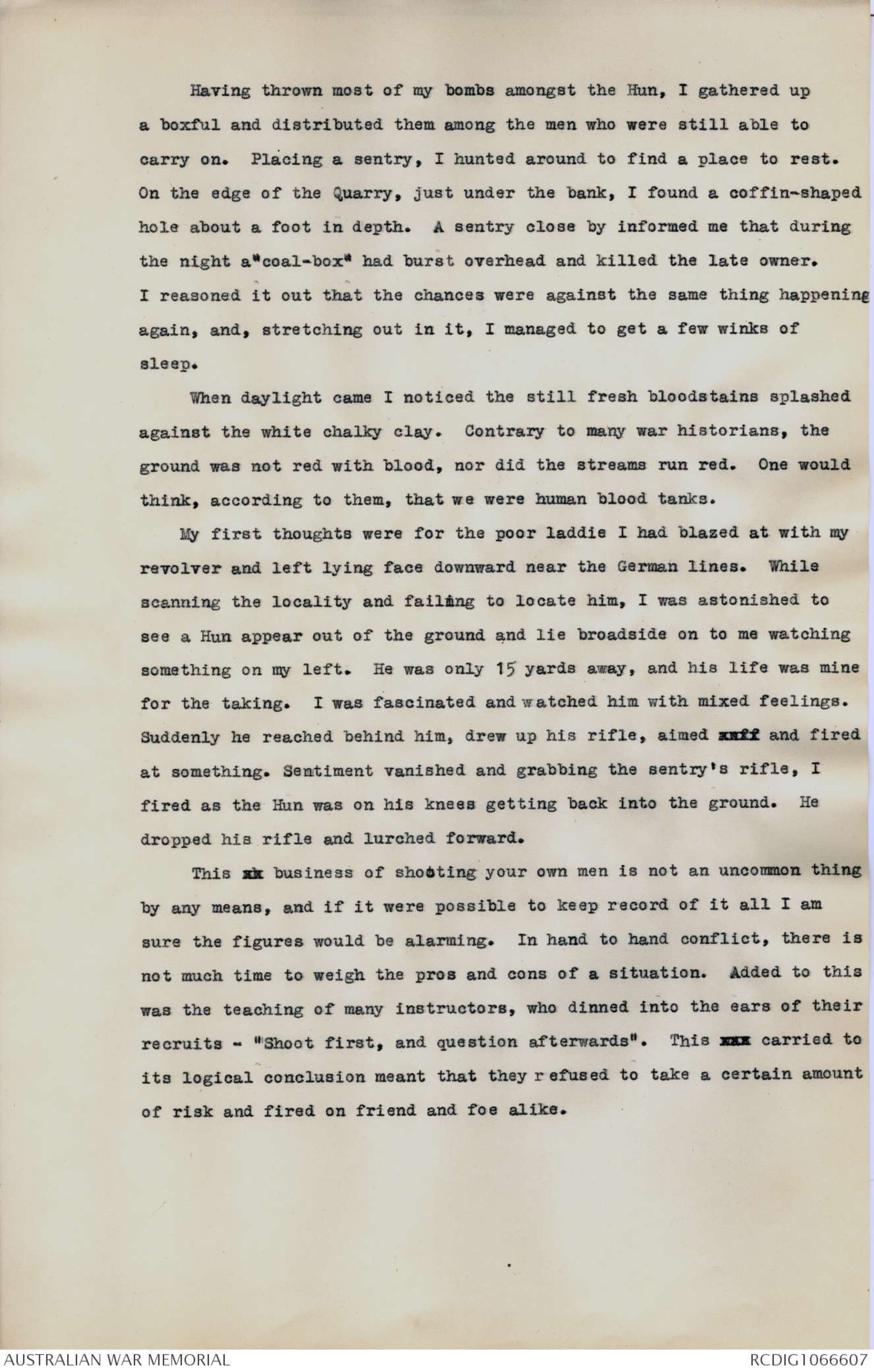
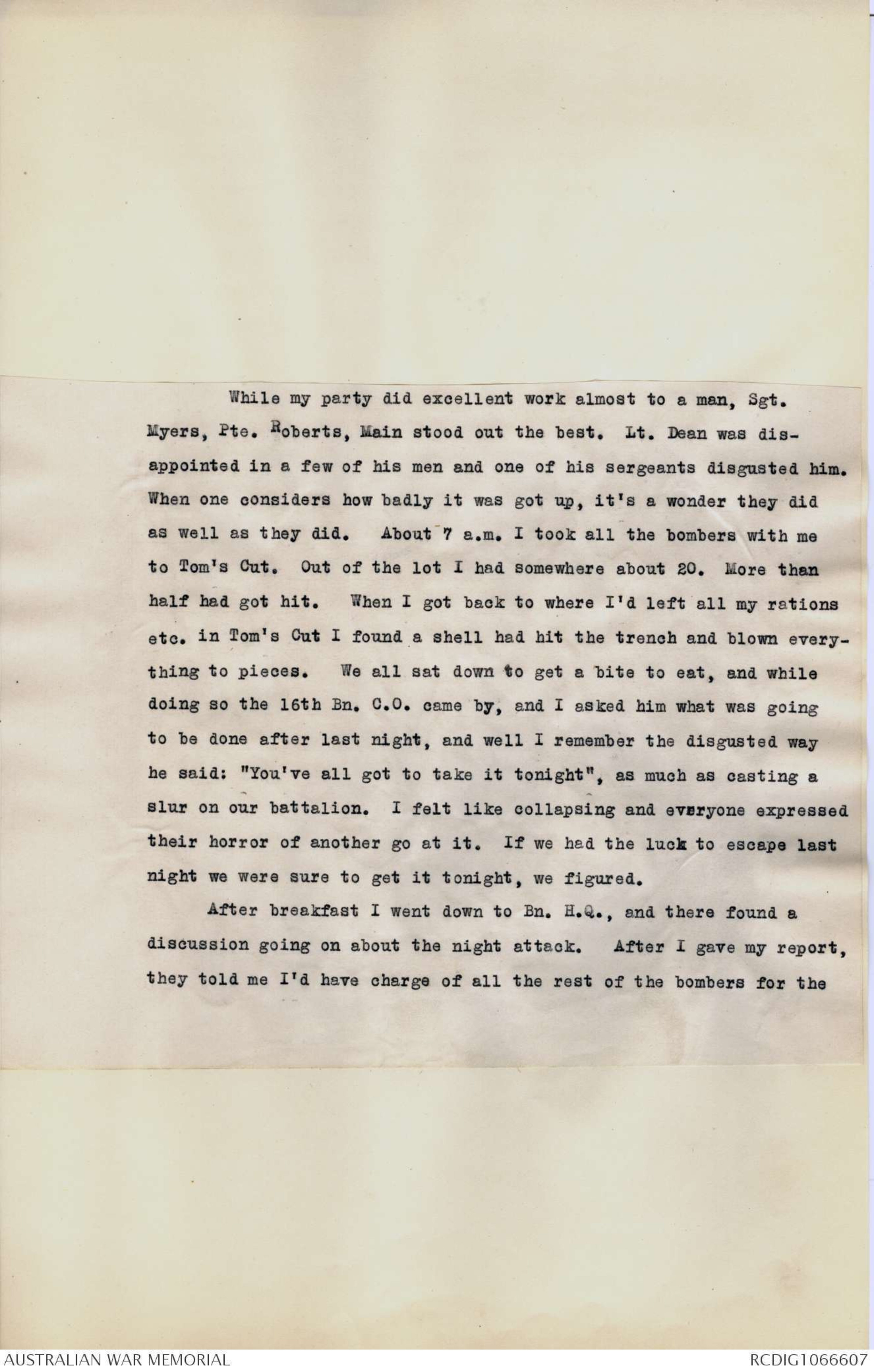
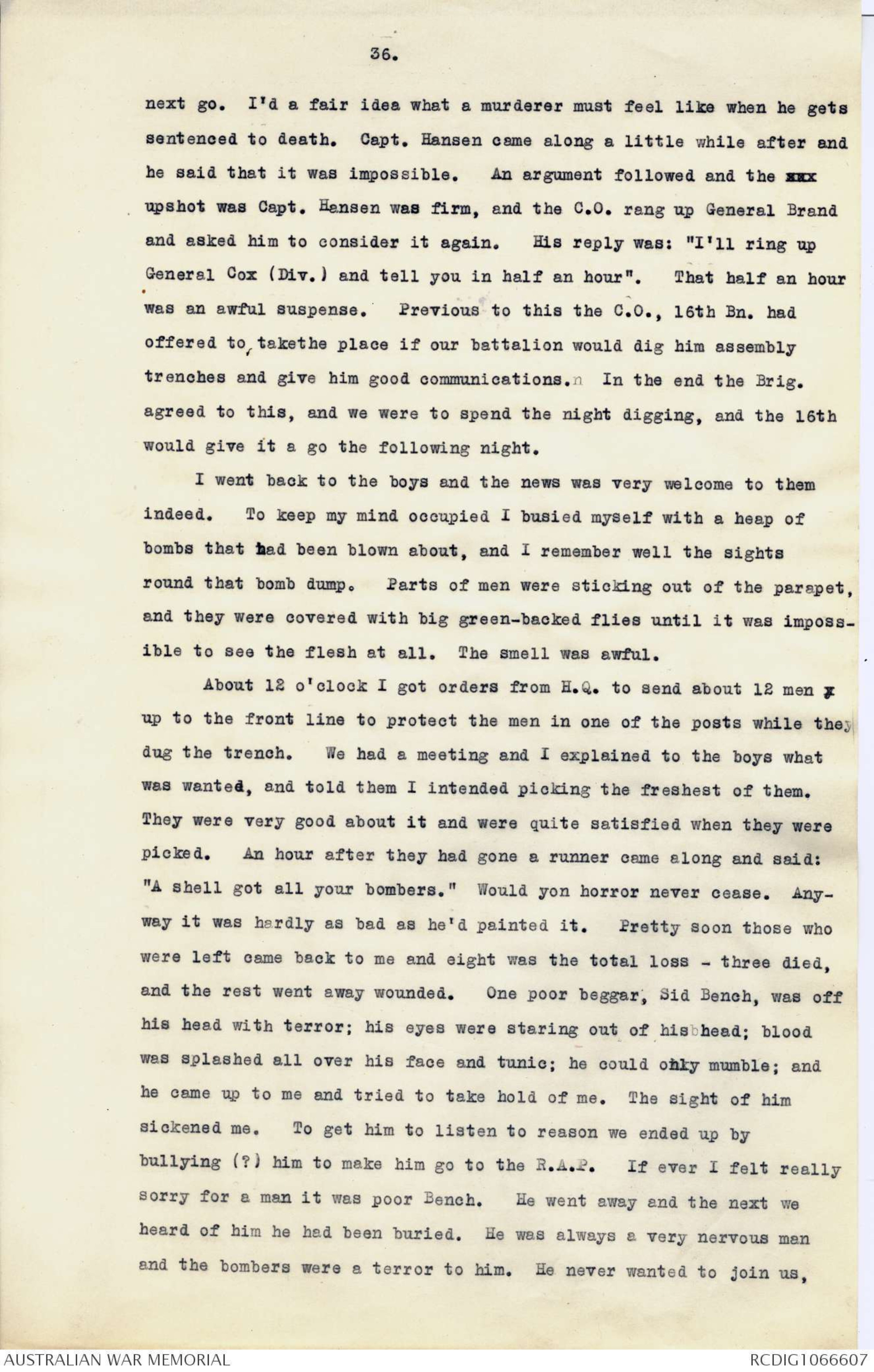
30.
to depend on. I may have done them an injustice, but I've always
had an idea that they were too scared to work the thing, and either
broke the thing themselves, or, if it did break, they were too xxxx
scared to go back and get another one.
During the afternoon parties came up with loads of bombs. The
Huns could see them coming into the quarry over the track and it was
just as good^ as telling them what was coming off; and it certainly was
no surprise to me when about 4 p.m. he shelled the quarry unmercifully
for about two hours with great big "coal-boxes". How on
earth he killed and wounded so few was a marvel to all of us. One
shell blew a heap of bombs up into the air and fortunately did very
little damage. The men were all perched half-way up the side of the
quarry in a little ledge and it gave them good cover. A little
while after this Lt. Dean and his men came up, and what with the
supporting platoons it was like a beehive. The arrangements were
something rotten - the battalion staff work could not have been worse
and it was more good luck than good management that any of us came
out of the show.
At 6 p.m. some of us were up having a look around when suddenly
the artillery opened with an awful crash. It was impossible to pick
out any particular gun, it was just a prolonged roar. A little over
on our left we could see clouds of smoke etc. rising from the bursting
shells, and the boys out in the posts saw English troops advance
to the attack. They told us afterwards that they reached the Hun
line, but had to clear out faster than they came. Not a word of this
had been told to us who were so close to the show.
Before dusk all men were given their bombs and the infantry
were given picks and shovels also. At dusk the artillery got to
work on us again and pelted as hard as they could. This constant
shelling had the wind us the lot of us and was beginning to tell on
the mens nerves; and to make matters worse, Bill Cocks came in from
Post 1 and reported Huns going in tomPost 62 54 by the drove.
When it came dark, flares were being shot up from in front of
the dugouts right in our line of attack, and I knew we would most
likely have to fight to get near the post. The shelling never let
Hand drawn diagram - see original document
31.
up at all, and I began to feel that the sooner it was all over the
better, because I never expected to see the rise of the sun. I
stayed up in the trench watching the post and noting where the
flares were all coming from for a long while, until I felt sick of
the whole thing and did not care if a shell blew me to pieces. I
went down into the dugout and reported what I'd seen to Hansen,
and remarking that it was an impossible job for so few men. His
reply was: "It's got to go on." I crouched into a corner and fell
fast asleep, and must have slept for about an hour until Hansen
woke us all up and told us it was time to get the men ready. Once
outside, to our surprise we found very few shells coming over.
Lt. Dean got his men together very quickly and moved off; and well
he did, because the runner got lost and they got to the hop-off
trench, Post 3, just as it was time to go over.
Our party were very slow in assembling, and when they were
all lined up and numbering off we found Pte. Porter was missing,
and all the N.C.O's had a final hunt round to find him. He could
not be found anywhere, so we moved off without him. He was about
the sleepiest fellow in the battalion and he was always an annoyance
to N.C.O's. Anyway he woke up just as we were moving and ran
after us. Just as game as anyone.
Lieut. Hayes, was in charge of my supporting platoon, came
along with me to the place where we were to get out of the trench,
A, and assisted us to get out as the trench at this particular
place was very deep. When word was passed up to me that all the
bombers were out, we got into our proper formation, two bayonet men
in front, one bomb thrower, one carrier, and rest spare men. "A'
coy's section was in front with Sgt. Myers in charge. He was
going to take his men to the far end of the post and "B" coy's
section under Cpl. Radcliffe was to go in the near end of the post.
A corporal from the coy. with 8 men were to follow up close behind
and attend to the dugouts along the bank. A signal had been arranged
between us and Coy. H.Q. One red ground flare was for reinforcements,
and two red flares were to denote capture.
I looked at my watch (or rather Hughie Stocks) I had to ex-
32.
exchange mine because it was not illuminated) and it was 10 to 12
and I decided to move up a little closer and wait for the trench xxxx
mortars to open. When we started to move the Huns must have seen us
from the top of the bank, because the flares they put up were quite
out of the ordinary. Two red, then some greens, and goodness knows
what. As we were in single file and hugging the bank it was impossible
for them to fire on us, and I began to thank my lucky stars that
we had come this way. I felt certain we were in for a killing, and
as I was in the lead I knew I was the first to collect. Once I saw
some objects leaning out of a shell-hole and I got into a hole and
watched them, not caring to fire unless they moved. With an effort I
crept up to them and found out that they were logs.
We got about half-way and got into shell-holes to wait. Every
time I looked behind I could see the long line of men following behind
like a snake. Flares were still going up and it looked more it
like daylight than night. I looked at my watch and it wanted seven
minutes to twelve. Two minutes more and the show would open. It
was not long in going and as I was looking at my watch I heard a
swish as a Stokes xxxxx mortar shell came tumbling through the air.
When it burst we crept forward again. The bursting shells were a
good guide, and they were coming over very quickly - one ^in about every
four or five seconds.
We crept up until we could feel the force of the explosion, and
then laid down. It was a wonder some of us were not hit, but we knew
it was our only salvation to get up close and rush in before the Hun
could get his head up. Watching the hour hand until it showed 12,
we got up as the last shell burst in the post, and the rest went over
on to the back of the post. Sgt. Myers filed by with his men and B
section turned to their left and went up a place which looked as if it
may have been a branch road.
I went up here with this section as its leaders were not quite
as good as A section. We only got in about 30 yards when the Huns
commenced to show themselves. We had got in far enough to have them
on all sides of us. Somehow or other I'd got a little ahead of the
33.
others and in between me and the rest a Hun officer got up and no
doubt intended to drop me. I never knew anything about it until next
day. Little Billy Main Mayne saw him, and put a bomb at his feet which
blew him over. Poor kid, he lost his life at Bullecourt; and I always
feel as if I owe my life to him. He was one of the nicest little
fellows we had, and as game as a bullant.
This was as far as we got. Some Huns showed up in front and we
pelted bombs into them as hard as we could go and they got for their
lives. Again on our right they showed up and they also ran before
the bombs. This crowd ran right down into Myer's party, and he and
his crowd were surrounded for a while. One man shot a Hun as he almost
fell on him. Anyway we had this part of the place and when I
looked around I only had about four men left. Previous to this I'd
seen Cpl. Smith staggering out wounded. The rest had vanished as they
got their issue.
I went out to the bottom of the bank and lit my red flare and
to my disgust I saw my supporting platoon all digging a trench about
100 yards away, and not making an effort to get to us. Just as I was
going back up to where the rest were, the Huns were coming back and
pelting bombs at us. One almost hit my foot and I only got about a
yard from it when off it went. I felt as if someone had stabbed me
with a lot of hot pins along my legs, and I felt blood running down my
hand. It knocked the breath out of me and I remember staggering
around for a while. It got that willing that we had to get out and
just as we reached the bottom of the bank Sgt. Myers and the remnants
of his party were then clearing for dear life too. My ears were
ringing with the row of their bombs, but above it all I could hear the
Huns yelling "Ja Ja" as they heaved their bombs.
We all got out about 50 yards and got into shell holes. We were
out of range of the Hun bombs and there did not seem to be any rifle
fire to speak of, although some of the boys said that they had to keep
their heads down in the shell holes at times. Captain Hansen's
orders were to dig in outside the place if we could not take it, and I
was sore perplexed what to do because we were under the bank and the
Hun could soon bomb us out. As we were waiting here, suddenly out of
34.
the smoke and dust two men appeared coming at us with fixed bayonets.
I was standing up at the time and managed to see them first.
I felt sure that all our men were out that could get out, and without
waiting I yelled to the lads to open on them. Three or four
rifles spoke and down they went; as they were falling I saw their
tin hats and realised who they were. One poor laddie staggered to
his feet and limped over to us.
Lieut. Hayes came up at this juncture and I asked him what he
thought of it. He said "No good", and I thought well if he was not
going to risk his skin I'd had enough. All the time his party
were still in the same place watching the show. Just before we
bolted I ran over to the man we had shot and he seemed as dead as
could be, and after pulling him over I left him. He was face down
with his knees under him.
By what Capt. Hansen said, the Hun opened up his artillery just
as soon as his S.O.S. went up, and in the excitement of it all we
never noticed it. But when we were getting back to the quarry the
shells got quite a few more of the lads. As soon as we got to
H.Q. I went straight to Capt. Hansen. "How did you get on, " he
said. "No good, chased out", I replied. "Yes, and you blodd
bloody well ran all the way I suppose", he said. It just knocked
me flat. Afterwards when he got the whole story, he felt sorry of
what he had said, that he just about apologised to the lads.
As we were coming in I saw two red flares coming from Lt.
Dean's objective, and I knew it meant that he had got his ground.
As I turned to go out I noticed the amount of wounded on the floor.
It was about the size of an ordinary kitchen and one could hardly
walk for wounded men. Suddenly we heard Lt. Dean's voice outside,
"Here we are, here we are again", and he staggered in his face
covered in blood. A bullet had lifted the top of his skull and he
had a wound that he died from some time after. He was as game as
any man could be and refused attendance until others were dressed.
He was one of the finest officers that I'd had anything to do with,
and the men could not say enough in his praise. The wounded kept
coming in, until the place resembled a shambles - men fairly laid
35.
on one another. It was impossible to take them out on account of
the shelling, and when dawn came the stretcher-bearers had an awful
job getting them out. It would be impossible to imagine a more
gruesome place than this quarry and dugout, and this thing was repeated
over and over again for other battalions. I'm positive
there's no place with a worse record than it.
Poor Dean's effort was just the same as ours had been; they
got in, and had to fly for their lives. Dean was hit and blinded
by blood. He was running around anywhere until old Ted Koles got
hold of him and led him out. All the same, if we suffered the Hun
suffered as much. The bombs that went down his dugout must have
worked awful havoc. Next morning four Hun stretcher-bearers stood
up waist high with red cross flags, and we watched the procession go
out, none of our lads firing on them.
Sgt. Myers' party bombed every dugout they saw, and one proved
to be a Red Cross dugout, but no one knew. I was in them afterwards,
and I don'twonder, that they heard awful yells.
Having thrown most of my bombs amongst the Hun, I gathered up
a boxful and distributed them among the men who were still able to
carry on. Placing a sentry, I hunted around to find a place to rest.
On the edge of the Quarry, just under the bank, I found a coffin-shaped
hole about a foot in depth. A sentry close by informed me that during
the night a"coal-box" had burst overhead and killed the late owner.
I reasoned it out that the chances were against the same thing happening
again, and, stretching out in it, I managed to get a few winks of
sleep.
When daylight came I noticed the still fresh bloodstains splashed
against the white chalky clay. Contrary to many war historians, the
ground was not red with blood, nor did the streams run red. One would
think, according to them, that we were human blood tanks.
My first thoughts were for the poor laddie I had blazed at with my
revolver and left lying face downward near the German lines. While
scanning the locality and failing to locate him, I was astonished to
see a Hun appear out of the ground and lie broadside on to me watching
something on my left. He was only 15 yards away, and his life was mine
for the taking. I was fascinated and watched him with mixed feelings.
Suddenly he reached behind him, drew up his rifle, aimed xoff and fired
at something. Sentiment vanished and grabbing the sentry's rifle, I
fired as the Hun was on his knees getting back into the ground. He
dropped his rifle and lurched forward.
This xx business of shooting your own men is not an uncommon thing
by any means, and if it were possible to keep record of it all I am
sure the figures would be alarming. In hand to hand conflict, there is
not much time to weigh the pros and cons of a situation. Added to this
was the teaching of many instructors, who dinned into the ears of their
recruits - "Shoot first, and question afterwards". This xxx carried to
its logical conclusion meant that they refused to take a certain amount
of risk and fired on friend and foe alike.
While my party did excellent work almost to a man, Sgt.
Myers, Pte. Hoberts, Main stood out the best. Lt. Dean was disappointed
in a few of his men and one of his sergeants disgusted him.
When one considers how badly it was got up, it's a wonder they did
as well as they did. About 7 a.m. I took all the bombers with me
to Tom's Cut. Out of the lot I had somewhere about 20. More than
half had got hit. When I got back to where I'd left all my rations
etc. in Tom's Cut I found a shell had hit the trench and blown everything
to pieces. We all sat down to get a bite to eat, and while
doing so the 16th Bn. C.O. came by, and I asked him what was going
to be done after last night, and well I remember the disgusted way
he said: "You've all got to take it tonight", as much as casting a
slur on our battalion. I felt like collapsing and everyone expressed
their horror of another go at it. If we had the luck to escape last
night we were sure to get it tonight, we figured.
After breakfast I went down to Bn. H.Q., and there found a
discussion going on about the night attack. After I gave my report,
they told me I'd have charge of all the rest of the bombers for the
36.
next go. I'd a fair idea what a murderer must feel like when he gets
sentenced to death. Capt. Hansen came along a little while after and
he said that it was impossible. An argument followed and the xxx
upshot was Capt. Hansen was firm, and the C.O. rang up General Brand
and asked him to consider it again. His reply was: "I'll ring up
General Cox (Div.) and tell you in half an hour". That half an hour
was an awful suspense. Previous to this the C.O., 16th Bn. had
offered to, takethe place if our battalion would dig him assembly
trenches and give him good communications.n In the end the Brig.
agreed to this, and we were to spend the night digging, and the 16th
would give it a go the following night.
I went back to the boys and the news was very welcome to them
indeed. To keep my mind occupied I busied myself with a heap of
bombs that had been blown about, and I remember well the sights
round that bomb dump. Parts of men were sticking out of the parapet,
and they were covered with big green-backed flies until it was impossible
to see the flesh at all. The smell was awful.
About 12 o'clock I got orders from H.Q. to send about 12 men x
up to the front line to protect the men in one of the posts while they
dug the trench. We had a meeting and I explained to the boys what
was wanted, and told them I intended picking the freshest of them.
They were very good about it and were quite satisfied when they were
picked. An hour after they had gone a runner came along and said:
"A shell got all your bombers." Would yon horror never cease. Anyway
it was hardly as bad as he'd painted it. Pretty soon those who
were left came back to me and eight was the total loss - three died,
and the rest went away wounded. One poor beggar, Sid Bench, was off
his head with terror; his eyes were staring out of hisbhead; blood
was splashed all over his face and tunic; he could only mumble; and
he came up to me and tried to take hold of me. The sight of him
sickened me. To get him to listen to reason we ended up by
bullying (?) him to make him go to the R.A.P. If ever I felt really
sorry for a man it was poor Bench. He went away and the next we
heard of him he had been buried. He was always a very nervous man
and the bombers were a terror to him. He never wanted to join us,
 Sandy Mudie
Sandy MudieThis transcription item is now locked to you for editing. To release the lock either Save your changes or Cancel.
This lock will be automatically released after 60 minutes of inactivity.